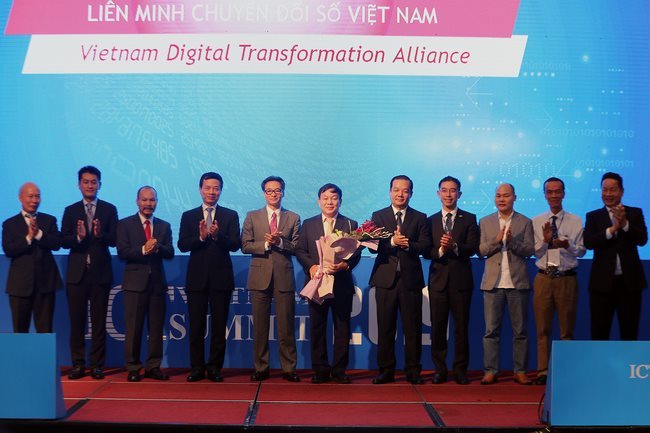 |
| Minister of Information and Communications Nguyen Manh Hung (4th L) and Deputy Prime Minister Vu Duc Dam (5th L) pose for a group photo at the launch of the Vietnam Digital Transformation Alliance in Hanoi on August 8 |
The minister was speaking at the 2019 edition of the Vietnam ICT Summit under the theme “Digital Transformation for a Prosperous Vietnam,” held in Hanoi today, August 8. The event brought together more than 700 delegates, who are authorities, policymakers, entrepreneurs and experts in the ICT field.
“If we have the right policy, Vietnam will grab this opportunity to become a developed country. Digital transformation is more of a policy and institutional revolution than a technological revolution,” Hung stated, adding that the transformation does not need many facilities as the major factor is a change in mindset.
According to the minister, ICT firms serve as a cornerstone in the transformation process. “We must develop 50,000 more ICT firms across the country to accelerate digital transformation in Vietnam.”
These firms will be divided into four categories. First, some 10-20 major technology firms with strong financial, market and manpower capacity could develop core technologies and ICT infrastructure.
“Large commercial and service firms, such as Viettel and Vingroup, could transform into technological, industrial, commercial and service corporations,” he said.
The second category is technology firms with 10-20 years of experience. “Currently, we have thousands of firms, but they mostly rely on outsourcing contracts. Now, they will create products and focus on digital transformation platforms,” he said.
Technology startups will be in charge of technology consultancy and technology transfers and will apply digital technologies in all the economic and social spheres. Meanwhile, innovation firms will introduce new technologies and business models.
The minister highlighted three strategic steps to ease digital transformation. The first step is to hasten the digitalization of various fields, while the second is to regard the transformation as a competitive edge in each field and organization.
Finally, the country should move toward the development of a comprehensive digital economy, setting up new-generation digital industries that act as catalysts for economic development.
Minister Hung said that the Government will launch a nationwide digital transformation strategy to create a digital economy and society later this year. The strategy has five key factors: institutions, infrastructure, cyber-security, platforms and human resource training.
Speaking at the summit, Deputy Prime Minister Vu Duc Dam said that the application of modern technologies, such as fifth-generation networks, artificial intelligence and blockchain, requires a mindset that stands ready to change old habits and thoughts.
To ease this change, Dam called for the development of a legal environment that offers policies to support ICT firms.
The senior Cabinet leader supposed that if firms adopted new technologies independently, they might not rush to invest in fourth- and fifth-generation networks since the third-generation network still has economic efficiency.
Enterprises must have economic benefits in terms of taxes, capital and resources rather than investment calls, he said.
Within the framework of the Vietnam ICT Summit 2019, the Vietnam Digital Transformation Alliance made their debut today morning. It includes eight first members that are Vietnam’s leading ICT firms, such as Viettel, FPT, VNPT, CMC, Mobifone and BKAV.
Van Ly
 Vietnam needs an additional 50,000 information and communication technology (ICT) firms to speed up digital transformation, said Minister of Information and Communications Nguyen Manh Hung.
Vietnam needs an additional 50,000 information and communication technology (ICT) firms to speed up digital transformation, said Minister of Information and Communications Nguyen Manh Hung.